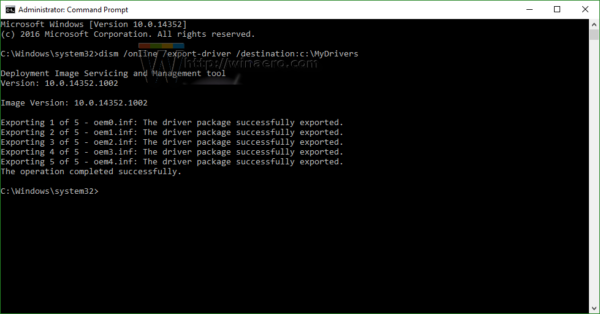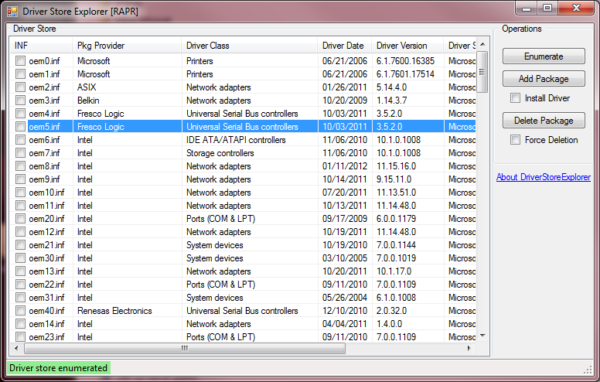Every time you re-install any version of Windows, you need to install drivers. This is not a problem if you have all your drivers downloaded or have disks provided by your hardware vendor. However, some users may not know where the drivers are stored, or for which hardware they exist and which are missing. You may still need to find drivers for every device you have. In Windows 10, you can create a backup of all installed drivers from a working installation of Windows using built-in tools before you re-install the operating system. You can do this without using third party tools. It can be very useful if you lost your downloaded or vendor-supplied drivers. Let's see how it can be done.
Advertisеment
In Windows 10, you can use the DISM tool to manage drivers you have installed in the currently running operating system. It is possible to export them to a folder using DISM, then re-install Windows and install them from that folder again. Here are step-by-step instructions to do so.
- Open an elevated command prompt.
- In the command prompt running as Administrator, type or copy-paste the following command:
dism /online /export-driver /destination:D:\MyDrivers
Replace the "D:\MyDrivers" portion with the actual path to the folder where you will store the drivers. It can be a folder on a separate partition of your disk drive or a folder on an external drive or USB flash drive.
The switches "/online /export-driver" tell DISM to look for drivers in the folder "C:\Windows\System32\DriverStore" of the currently running operating system.
- When started, DISM will produce an output like this:

That's it. Now you have a backup of drivers made with the built-in DISM tool! The next time you re-install Windows 10, you will be able to use this backup to install drivers for all your devices.
Later, you can restore them using the following command:
Dism /online /Add-Driver /Driver:D:\MyDrivers /Recurse
Tip: You can inspect installed drivers on an existing Windows installation quickly using the free tool "DriverStore Explorer [RAPR.exe]". You can grab it HERE. It will list all installed drivers with a friendly user interface. 
Also, when Windows is reinstalled, you can quickly add drivers back to the operating system driver store using DISM /Add-Driver switch or using this tool. The application require .NET framework 3.5. See Offline install of .NET Framework 3.5 in Windows 10 using DISM.
Note that the driver backup method supports only .inf drivers. Drivers that are installed using Windows Installer (MSI) or other driver package types (such as .exe files) are not supported.
Credits for this tip go to Ed Tittel at Windows Enterprise Desktop.
Support us
Winaero greatly relies on your support. You can help the site keep bringing you interesting and useful content and software by using these options:

Just by now for the Dummys of us. :3
On a clean Windows 10 install will by doing this:
dism /online /Add-Driver /Driver:D:\MyDrivers
Add all drivers to Windows which are in this path? :)
Added^
Thanks.
Great solution.
Saves a lot of work.
Thank you.
Don’t mention it.
‘Dism / online add-driver’ Do not work with the version of 10586.
What version did you test?
It should work even in Windows 8.1 Update
Thanks for the shout-out, Sergey! After all the times I’ve cited your work, it’s nice to see things turned around the other way. Keep up the good work yourself. Best wishes, –Ed–
You are writing excellent articles, Ed.
Was happy to cite you back.
Dism /online /Add-Driver /Driver:D:\MyDrivers /Recurse
DISM /Add-Driver will only work on offline images.
Tried out here on a new install of windows. :/
It works only with the Tool DriverStoreExplorer to import all the driver.
One .inf by one .. not all by once. >,>
The “restore” cmd can only be used on an image… not to restore drivers in Windows.
dism /online /Add-Driver /Driver:C:\Users\admin\Desktop\Scripts\AudioDrivers /Recurse
Deployment Image Servicing and Management tool
Version: 10.0.14393.0
Image Version: 10.0.14393.0
Error: 50
This command can only be used with an offline image.
The DISM log file can be found at C:\WINDOWS\Logs\DISM\dism.log
C:\WINDOWS\system32>
THis inFO is AWesome Guys thankyou hEAPz..
Dism is hard to wrap my head around but Im starting to see the Benefits of Powerrshell.
Just wondering is there a DiSM command to EXPORT and IMPORT
the way you like Windows 10 Explorer Views to be?
OR
File ICON Associations, Folder ICON Associations, MY PC ICON Associations etc.?
Everytime I do a NEW install , it takes like 1 to 2 hours to set up
Default FOLDER View
File ICON Associations – Hard Drive Icons , mp4 mp3 Icons etc.
Default APPLiCATiONS to open files – mp4 mp3 txt etc.
Remove Services, install games etc,
Cheers
Appoligies if I asked a QU already posted..
Thanks for one’s marvelous posting! I certainly enjoyed reading it, you might be a great author. I will ensure that I bookmark your blog and will come back in the foreseeable future. I want to encourage you to ultimately continue your great work, have a nice day.
Hiya, I am really glad I have found this info. Nowadays bloggers publish just about gossips and internet and this is actually irritating. A good site with interesting content, this is what I need. Thank you for keeping this web site, I’ll be visiting it. Do you do newsletters? Can not find it.
I really appreciate this post. I’ve been looking all over for this! Thank goodness I found it here. You have made my day! Thank you again
The link to “DriverStore Explorer” doesn’t work!
Here – https://github.com/lostindark/DriverStoreExplorer
Thank you very much, I’ve updated the link.